Case Study: Ethical Considerations in Patient Care (HRM4007D)
VerifiedAdded on 2022/08/25
|16
|4226
|21
Report
AI Summary
This assignment presents a detailed analysis of a nursing case study involving Mrs. Wang, a patient diagnosed with malignant lung cancer, who prefers to communicate in Mandarin, posing challenges for healthcare professionals. The paper explores the ethical principles at stake, particularly autonomy, dignity, and the right to information, while addressing the family's wishes regarding the patient's health disclosure. It examines various communication strategies, including the use of interpreters and non-verbal cues, to ensure effective patient interaction and respect for cultural preferences. The assignment also delves into the importance of palliative care, pain management, and end-of-life considerations, including advanced health directives and spiritual support. Furthermore, it emphasizes the significance of patient self-determination and the role of healthcare providers in facilitating a meaningful end-of-life experience. The report concludes with a reflection on how the case study contributes to the student's learning and professional development in healthcare ethics and practice.
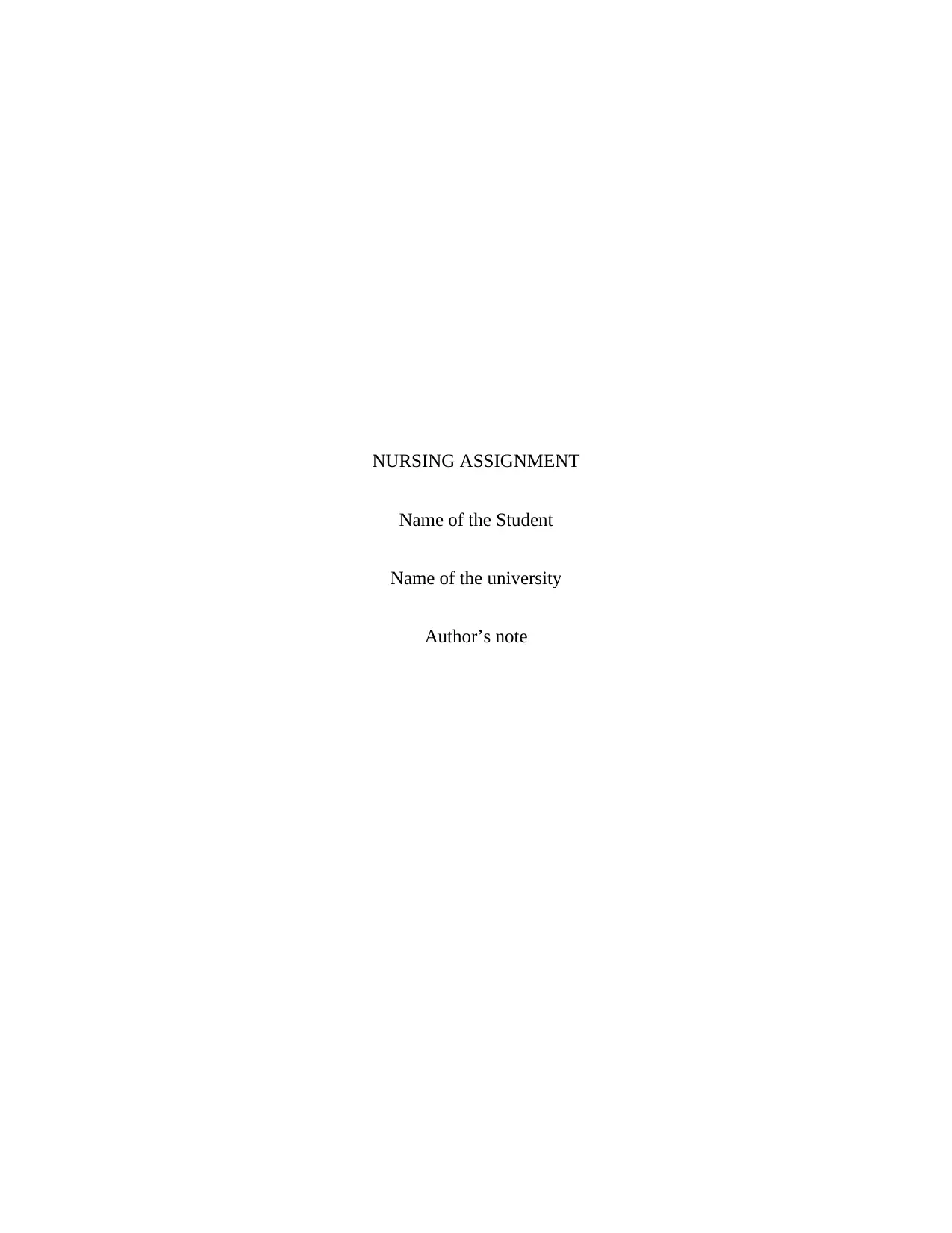
NURSING ASSIGNMENT
Name of the Student
Name of the university
Author’s note
Name of the Student
Name of the university
Author’s note
Paraphrase This Document
Need a fresh take? Get an instant paraphrase of this document with our AI Paraphraser
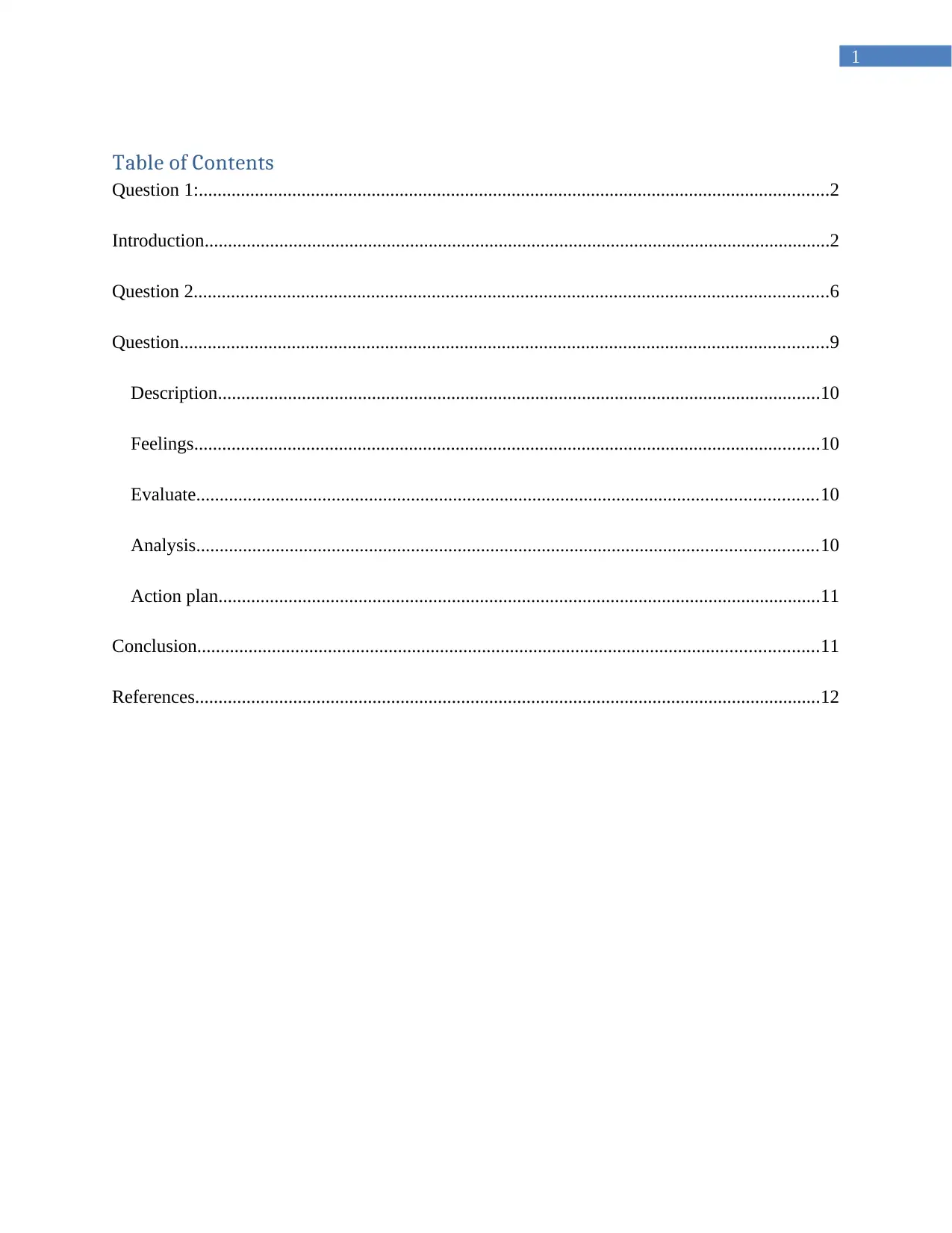
1
Table of Contents
Question 1:.......................................................................................................................................2
Introduction......................................................................................................................................2
Question 2........................................................................................................................................6
Question...........................................................................................................................................9
Description.................................................................................................................................10
Feelings......................................................................................................................................10
Evaluate.....................................................................................................................................10
Analysis.....................................................................................................................................10
Action plan.................................................................................................................................11
Conclusion.....................................................................................................................................11
References......................................................................................................................................12
Table of Contents
Question 1:.......................................................................................................................................2
Introduction......................................................................................................................................2
Question 2........................................................................................................................................6
Question...........................................................................................................................................9
Description.................................................................................................................................10
Feelings......................................................................................................................................10
Evaluate.....................................................................................................................................10
Analysis.....................................................................................................................................10
Action plan.................................................................................................................................11
Conclusion.....................................................................................................................................11
References......................................................................................................................................12
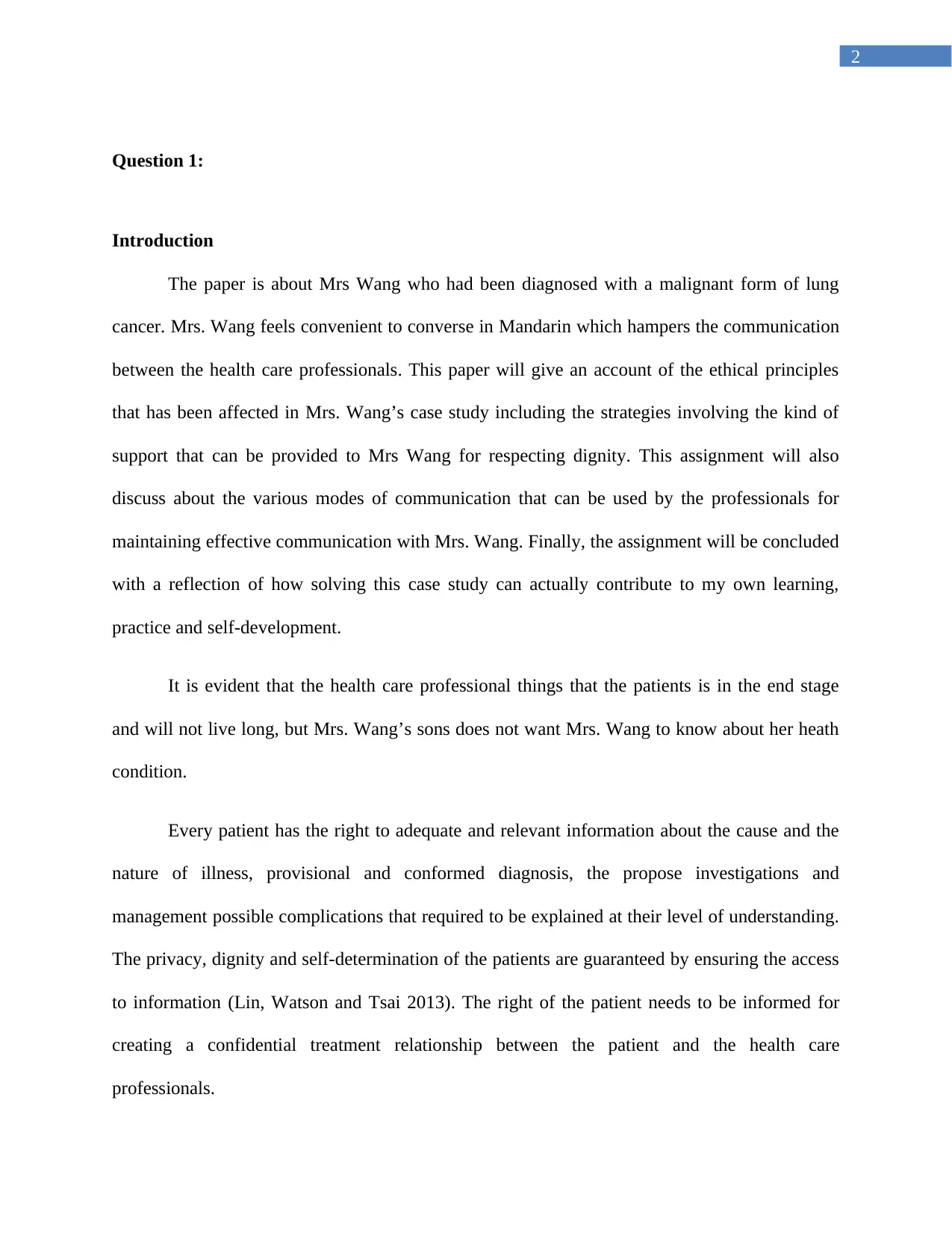
2
Question 1:
Introduction
The paper is about Mrs Wang who had been diagnosed with a malignant form of lung
cancer. Mrs. Wang feels convenient to converse in Mandarin which hampers the communication
between the health care professionals. This paper will give an account of the ethical principles
that has been affected in Mrs. Wang’s case study including the strategies involving the kind of
support that can be provided to Mrs Wang for respecting dignity. This assignment will also
discuss about the various modes of communication that can be used by the professionals for
maintaining effective communication with Mrs. Wang. Finally, the assignment will be concluded
with a reflection of how solving this case study can actually contribute to my own learning,
practice and self-development.
It is evident that the health care professional things that the patients is in the end stage
and will not live long, but Mrs. Wang’s sons does not want Mrs. Wang to know about her heath
condition.
Every patient has the right to adequate and relevant information about the cause and the
nature of illness, provisional and conformed diagnosis, the propose investigations and
management possible complications that required to be explained at their level of understanding.
The privacy, dignity and self-determination of the patients are guaranteed by ensuring the access
to information (Lin, Watson and Tsai 2013). The right of the patient needs to be informed for
creating a confidential treatment relationship between the patient and the health care
professionals.
Question 1:
Introduction
The paper is about Mrs Wang who had been diagnosed with a malignant form of lung
cancer. Mrs. Wang feels convenient to converse in Mandarin which hampers the communication
between the health care professionals. This paper will give an account of the ethical principles
that has been affected in Mrs. Wang’s case study including the strategies involving the kind of
support that can be provided to Mrs Wang for respecting dignity. This assignment will also
discuss about the various modes of communication that can be used by the professionals for
maintaining effective communication with Mrs. Wang. Finally, the assignment will be concluded
with a reflection of how solving this case study can actually contribute to my own learning,
practice and self-development.
It is evident that the health care professional things that the patients is in the end stage
and will not live long, but Mrs. Wang’s sons does not want Mrs. Wang to know about her heath
condition.
Every patient has the right to adequate and relevant information about the cause and the
nature of illness, provisional and conformed diagnosis, the propose investigations and
management possible complications that required to be explained at their level of understanding.
The privacy, dignity and self-determination of the patients are guaranteed by ensuring the access
to information (Lin, Watson and Tsai 2013). The right of the patient needs to be informed for
creating a confidential treatment relationship between the patient and the health care
professionals.
⊘ This is a preview!⊘
Do you want full access?
Subscribe today to unlock all pages.

Trusted by 1+ million students worldwide
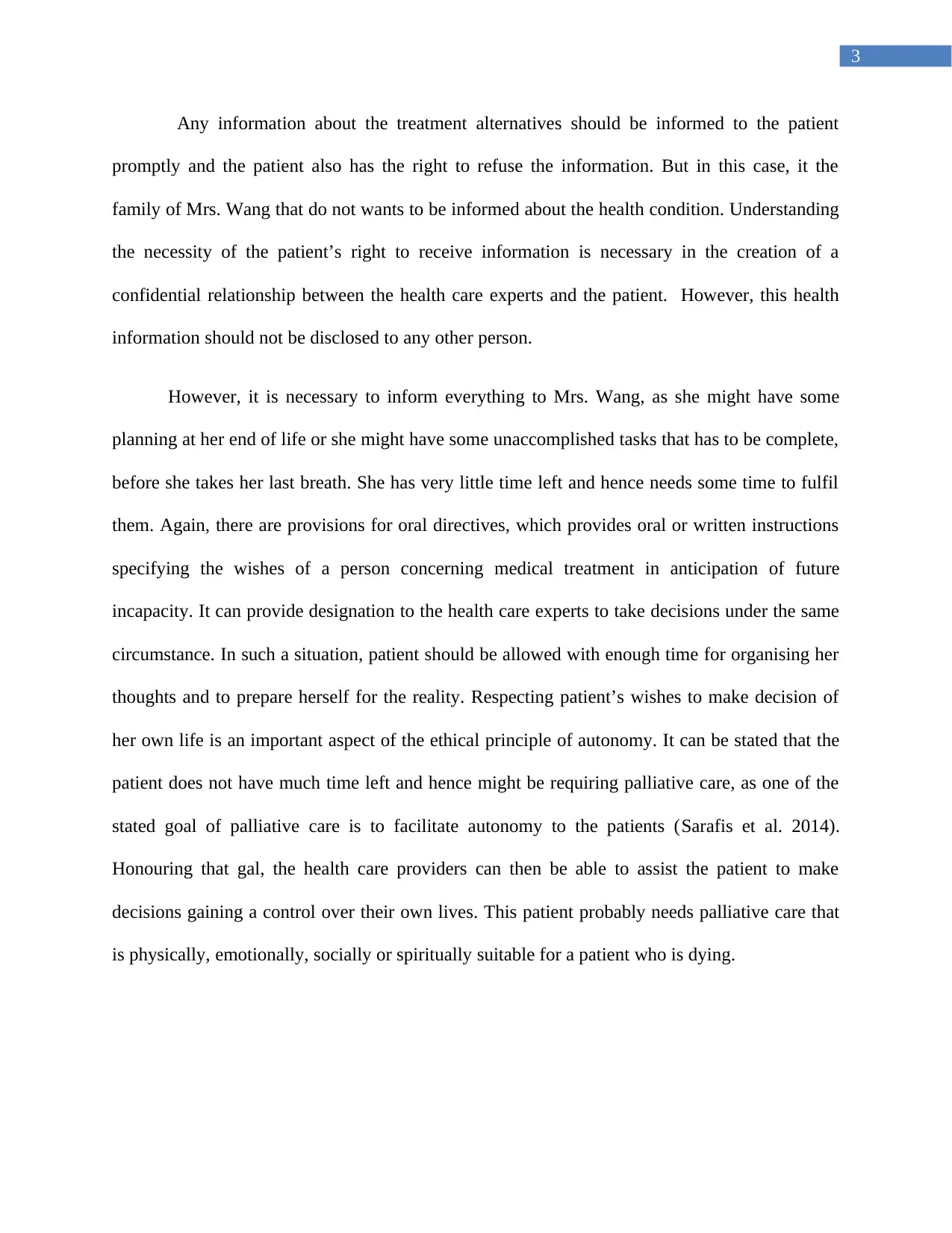
3
Any information about the treatment alternatives should be informed to the patient
promptly and the patient also has the right to refuse the information. But in this case, it the
family of Mrs. Wang that do not wants to be informed about the health condition. Understanding
the necessity of the patient’s right to receive information is necessary in the creation of a
confidential relationship between the health care experts and the patient. However, this health
information should not be disclosed to any other person.
However, it is necessary to inform everything to Mrs. Wang, as she might have some
planning at her end of life or she might have some unaccomplished tasks that has to be complete,
before she takes her last breath. She has very little time left and hence needs some time to fulfil
them. Again, there are provisions for oral directives, which provides oral or written instructions
specifying the wishes of a person concerning medical treatment in anticipation of future
incapacity. It can provide designation to the health care experts to take decisions under the same
circumstance. In such a situation, patient should be allowed with enough time for organising her
thoughts and to prepare herself for the reality. Respecting patient’s wishes to make decision of
her own life is an important aspect of the ethical principle of autonomy. It can be stated that the
patient does not have much time left and hence might be requiring palliative care, as one of the
stated goal of palliative care is to facilitate autonomy to the patients (Sarafis et al. 2014).
Honouring that gal, the health care providers can then be able to assist the patient to make
decisions gaining a control over their own lives. This patient probably needs palliative care that
is physically, emotionally, socially or spiritually suitable for a patient who is dying.
Any information about the treatment alternatives should be informed to the patient
promptly and the patient also has the right to refuse the information. But in this case, it the
family of Mrs. Wang that do not wants to be informed about the health condition. Understanding
the necessity of the patient’s right to receive information is necessary in the creation of a
confidential relationship between the health care experts and the patient. However, this health
information should not be disclosed to any other person.
However, it is necessary to inform everything to Mrs. Wang, as she might have some
planning at her end of life or she might have some unaccomplished tasks that has to be complete,
before she takes her last breath. She has very little time left and hence needs some time to fulfil
them. Again, there are provisions for oral directives, which provides oral or written instructions
specifying the wishes of a person concerning medical treatment in anticipation of future
incapacity. It can provide designation to the health care experts to take decisions under the same
circumstance. In such a situation, patient should be allowed with enough time for organising her
thoughts and to prepare herself for the reality. Respecting patient’s wishes to make decision of
her own life is an important aspect of the ethical principle of autonomy. It can be stated that the
patient does not have much time left and hence might be requiring palliative care, as one of the
stated goal of palliative care is to facilitate autonomy to the patients (Sarafis et al. 2014).
Honouring that gal, the health care providers can then be able to assist the patient to make
decisions gaining a control over their own lives. This patient probably needs palliative care that
is physically, emotionally, socially or spiritually suitable for a patient who is dying.
Paraphrase This Document
Need a fresh take? Get an instant paraphrase of this document with our AI Paraphraser
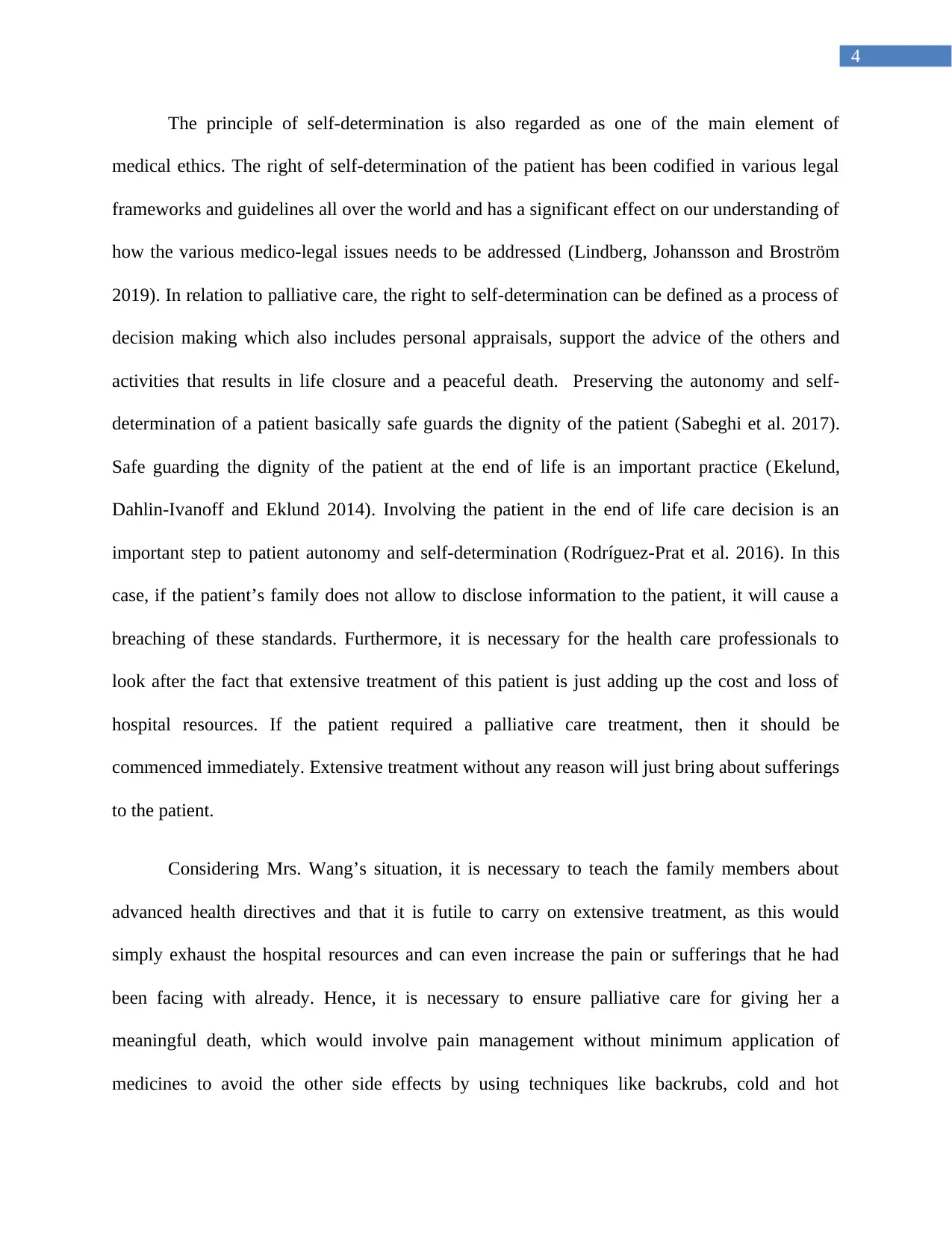
4
The principle of self-determination is also regarded as one of the main element of
medical ethics. The right of self-determination of the patient has been codified in various legal
frameworks and guidelines all over the world and has a significant effect on our understanding of
how the various medico-legal issues needs to be addressed (Lindberg, Johansson and Broström
2019). In relation to palliative care, the right to self-determination can be defined as a process of
decision making which also includes personal appraisals, support the advice of the others and
activities that results in life closure and a peaceful death. Preserving the autonomy and self-
determination of a patient basically safe guards the dignity of the patient (Sabeghi et al. 2017).
Safe guarding the dignity of the patient at the end of life is an important practice (Ekelund,
Dahlin-Ivanoff and Eklund 2014). Involving the patient in the end of life care decision is an
important step to patient autonomy and self-determination (Rodríguez-Prat et al. 2016). In this
case, if the patient’s family does not allow to disclose information to the patient, it will cause a
breaching of these standards. Furthermore, it is necessary for the health care professionals to
look after the fact that extensive treatment of this patient is just adding up the cost and loss of
hospital resources. If the patient required a palliative care treatment, then it should be
commenced immediately. Extensive treatment without any reason will just bring about sufferings
to the patient.
Considering Mrs. Wang’s situation, it is necessary to teach the family members about
advanced health directives and that it is futile to carry on extensive treatment, as this would
simply exhaust the hospital resources and can even increase the pain or sufferings that he had
been facing with already. Hence, it is necessary to ensure palliative care for giving her a
meaningful death, which would involve pain management without minimum application of
medicines to avoid the other side effects by using techniques like backrubs, cold and hot
The principle of self-determination is also regarded as one of the main element of
medical ethics. The right of self-determination of the patient has been codified in various legal
frameworks and guidelines all over the world and has a significant effect on our understanding of
how the various medico-legal issues needs to be addressed (Lindberg, Johansson and Broström
2019). In relation to palliative care, the right to self-determination can be defined as a process of
decision making which also includes personal appraisals, support the advice of the others and
activities that results in life closure and a peaceful death. Preserving the autonomy and self-
determination of a patient basically safe guards the dignity of the patient (Sabeghi et al. 2017).
Safe guarding the dignity of the patient at the end of life is an important practice (Ekelund,
Dahlin-Ivanoff and Eklund 2014). Involving the patient in the end of life care decision is an
important step to patient autonomy and self-determination (Rodríguez-Prat et al. 2016). In this
case, if the patient’s family does not allow to disclose information to the patient, it will cause a
breaching of these standards. Furthermore, it is necessary for the health care professionals to
look after the fact that extensive treatment of this patient is just adding up the cost and loss of
hospital resources. If the patient required a palliative care treatment, then it should be
commenced immediately. Extensive treatment without any reason will just bring about sufferings
to the patient.
Considering Mrs. Wang’s situation, it is necessary to teach the family members about
advanced health directives and that it is futile to carry on extensive treatment, as this would
simply exhaust the hospital resources and can even increase the pain or sufferings that he had
been facing with already. Hence, it is necessary to ensure palliative care for giving her a
meaningful death, which would involve pain management without minimum application of
medicines to avoid the other side effects by using techniques like backrubs, cold and hot
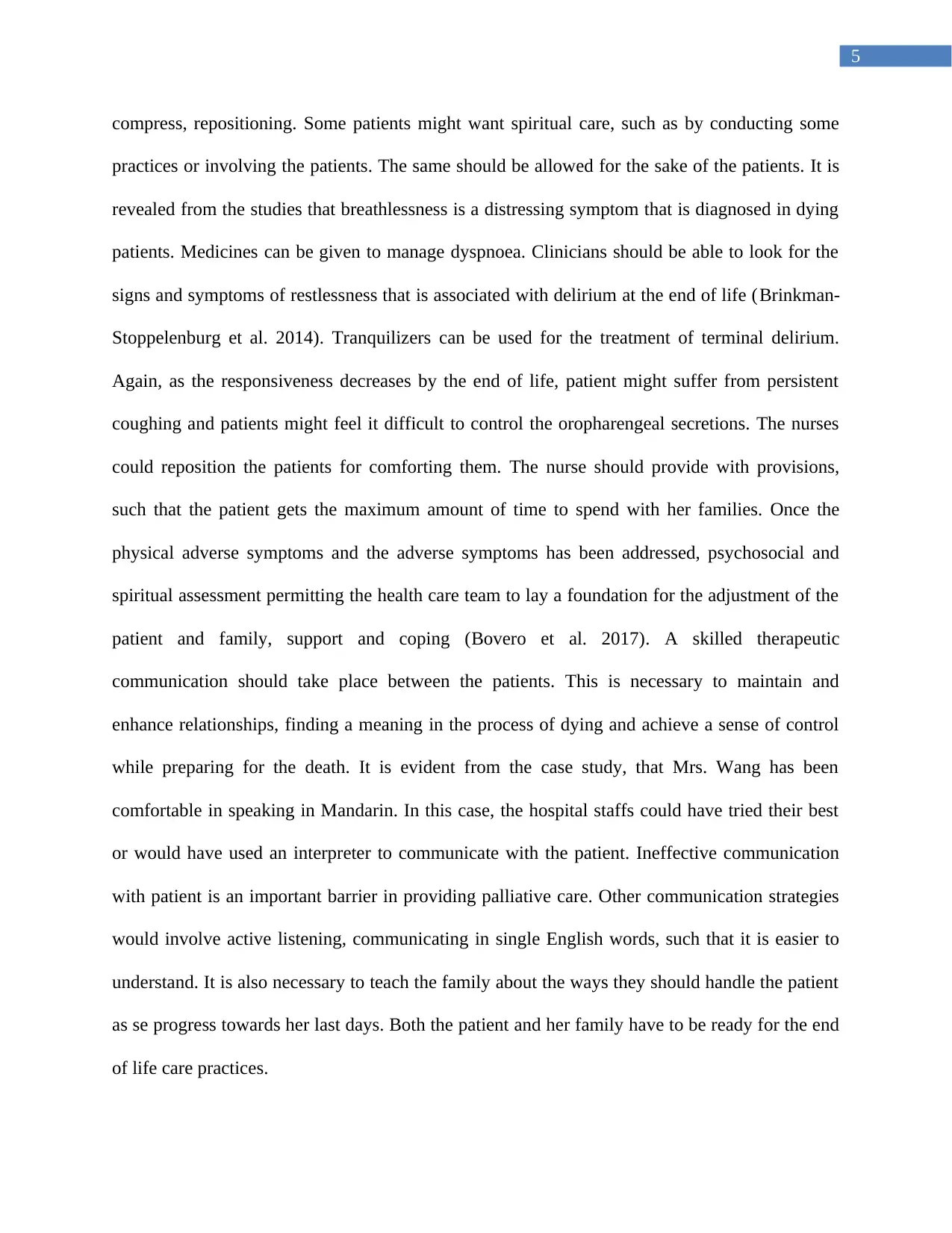
5
compress, repositioning. Some patients might want spiritual care, such as by conducting some
practices or involving the patients. The same should be allowed for the sake of the patients. It is
revealed from the studies that breathlessness is a distressing symptom that is diagnosed in dying
patients. Medicines can be given to manage dyspnoea. Clinicians should be able to look for the
signs and symptoms of restlessness that is associated with delirium at the end of life (Brinkman-
Stoppelenburg et al. 2014). Tranquilizers can be used for the treatment of terminal delirium.
Again, as the responsiveness decreases by the end of life, patient might suffer from persistent
coughing and patients might feel it difficult to control the oropharengeal secretions. The nurses
could reposition the patients for comforting them. The nurse should provide with provisions,
such that the patient gets the maximum amount of time to spend with her families. Once the
physical adverse symptoms and the adverse symptoms has been addressed, psychosocial and
spiritual assessment permitting the health care team to lay a foundation for the adjustment of the
patient and family, support and coping (Bovero et al. 2017). A skilled therapeutic
communication should take place between the patients. This is necessary to maintain and
enhance relationships, finding a meaning in the process of dying and achieve a sense of control
while preparing for the death. It is evident from the case study, that Mrs. Wang has been
comfortable in speaking in Mandarin. In this case, the hospital staffs could have tried their best
or would have used an interpreter to communicate with the patient. Ineffective communication
with patient is an important barrier in providing palliative care. Other communication strategies
would involve active listening, communicating in single English words, such that it is easier to
understand. It is also necessary to teach the family about the ways they should handle the patient
as se progress towards her last days. Both the patient and her family have to be ready for the end
of life care practices.
compress, repositioning. Some patients might want spiritual care, such as by conducting some
practices or involving the patients. The same should be allowed for the sake of the patients. It is
revealed from the studies that breathlessness is a distressing symptom that is diagnosed in dying
patients. Medicines can be given to manage dyspnoea. Clinicians should be able to look for the
signs and symptoms of restlessness that is associated with delirium at the end of life (Brinkman-
Stoppelenburg et al. 2014). Tranquilizers can be used for the treatment of terminal delirium.
Again, as the responsiveness decreases by the end of life, patient might suffer from persistent
coughing and patients might feel it difficult to control the oropharengeal secretions. The nurses
could reposition the patients for comforting them. The nurse should provide with provisions,
such that the patient gets the maximum amount of time to spend with her families. Once the
physical adverse symptoms and the adverse symptoms has been addressed, psychosocial and
spiritual assessment permitting the health care team to lay a foundation for the adjustment of the
patient and family, support and coping (Bovero et al. 2017). A skilled therapeutic
communication should take place between the patients. This is necessary to maintain and
enhance relationships, finding a meaning in the process of dying and achieve a sense of control
while preparing for the death. It is evident from the case study, that Mrs. Wang has been
comfortable in speaking in Mandarin. In this case, the hospital staffs could have tried their best
or would have used an interpreter to communicate with the patient. Ineffective communication
with patient is an important barrier in providing palliative care. Other communication strategies
would involve active listening, communicating in single English words, such that it is easier to
understand. It is also necessary to teach the family about the ways they should handle the patient
as se progress towards her last days. Both the patient and her family have to be ready for the end
of life care practices.
⊘ This is a preview!⊘
Do you want full access?
Subscribe today to unlock all pages.

Trusted by 1+ million students worldwide

6
Paraphrase This Document
Need a fresh take? Get an instant paraphrase of this document with our AI Paraphraser
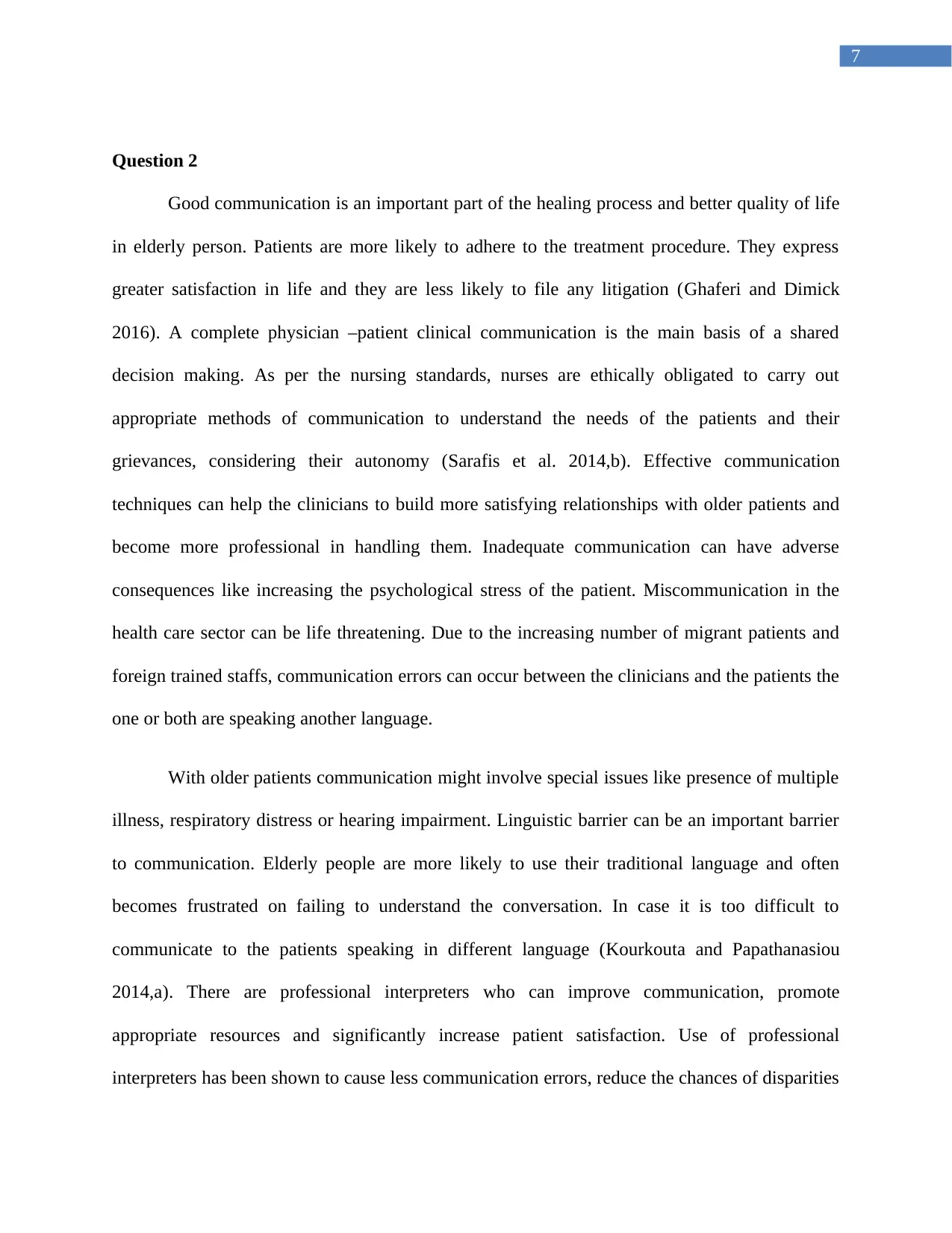
7
Question 2
Good communication is an important part of the healing process and better quality of life
in elderly person. Patients are more likely to adhere to the treatment procedure. They express
greater satisfaction in life and they are less likely to file any litigation (Ghaferi and Dimick
2016). A complete physician –patient clinical communication is the main basis of a shared
decision making. As per the nursing standards, nurses are ethically obligated to carry out
appropriate methods of communication to understand the needs of the patients and their
grievances, considering their autonomy (Sarafis et al. 2014,b). Effective communication
techniques can help the clinicians to build more satisfying relationships with older patients and
become more professional in handling them. Inadequate communication can have adverse
consequences like increasing the psychological stress of the patient. Miscommunication in the
health care sector can be life threatening. Due to the increasing number of migrant patients and
foreign trained staffs, communication errors can occur between the clinicians and the patients the
one or both are speaking another language.
With older patients communication might involve special issues like presence of multiple
illness, respiratory distress or hearing impairment. Linguistic barrier can be an important barrier
to communication. Elderly people are more likely to use their traditional language and often
becomes frustrated on failing to understand the conversation. In case it is too difficult to
communicate to the patients speaking in different language (Kourkouta and Papathanasiou
2014,a). There are professional interpreters who can improve communication, promote
appropriate resources and significantly increase patient satisfaction. Use of professional
interpreters has been shown to cause less communication errors, reduce the chances of disparities
Question 2
Good communication is an important part of the healing process and better quality of life
in elderly person. Patients are more likely to adhere to the treatment procedure. They express
greater satisfaction in life and they are less likely to file any litigation (Ghaferi and Dimick
2016). A complete physician –patient clinical communication is the main basis of a shared
decision making. As per the nursing standards, nurses are ethically obligated to carry out
appropriate methods of communication to understand the needs of the patients and their
grievances, considering their autonomy (Sarafis et al. 2014,b). Effective communication
techniques can help the clinicians to build more satisfying relationships with older patients and
become more professional in handling them. Inadequate communication can have adverse
consequences like increasing the psychological stress of the patient. Miscommunication in the
health care sector can be life threatening. Due to the increasing number of migrant patients and
foreign trained staffs, communication errors can occur between the clinicians and the patients the
one or both are speaking another language.
With older patients communication might involve special issues like presence of multiple
illness, respiratory distress or hearing impairment. Linguistic barrier can be an important barrier
to communication. Elderly people are more likely to use their traditional language and often
becomes frustrated on failing to understand the conversation. In case it is too difficult to
communicate to the patients speaking in different language (Kourkouta and Papathanasiou
2014,a). There are professional interpreters who can improve communication, promote
appropriate resources and significantly increase patient satisfaction. Use of professional
interpreters has been shown to cause less communication errors, reduce the chances of disparities
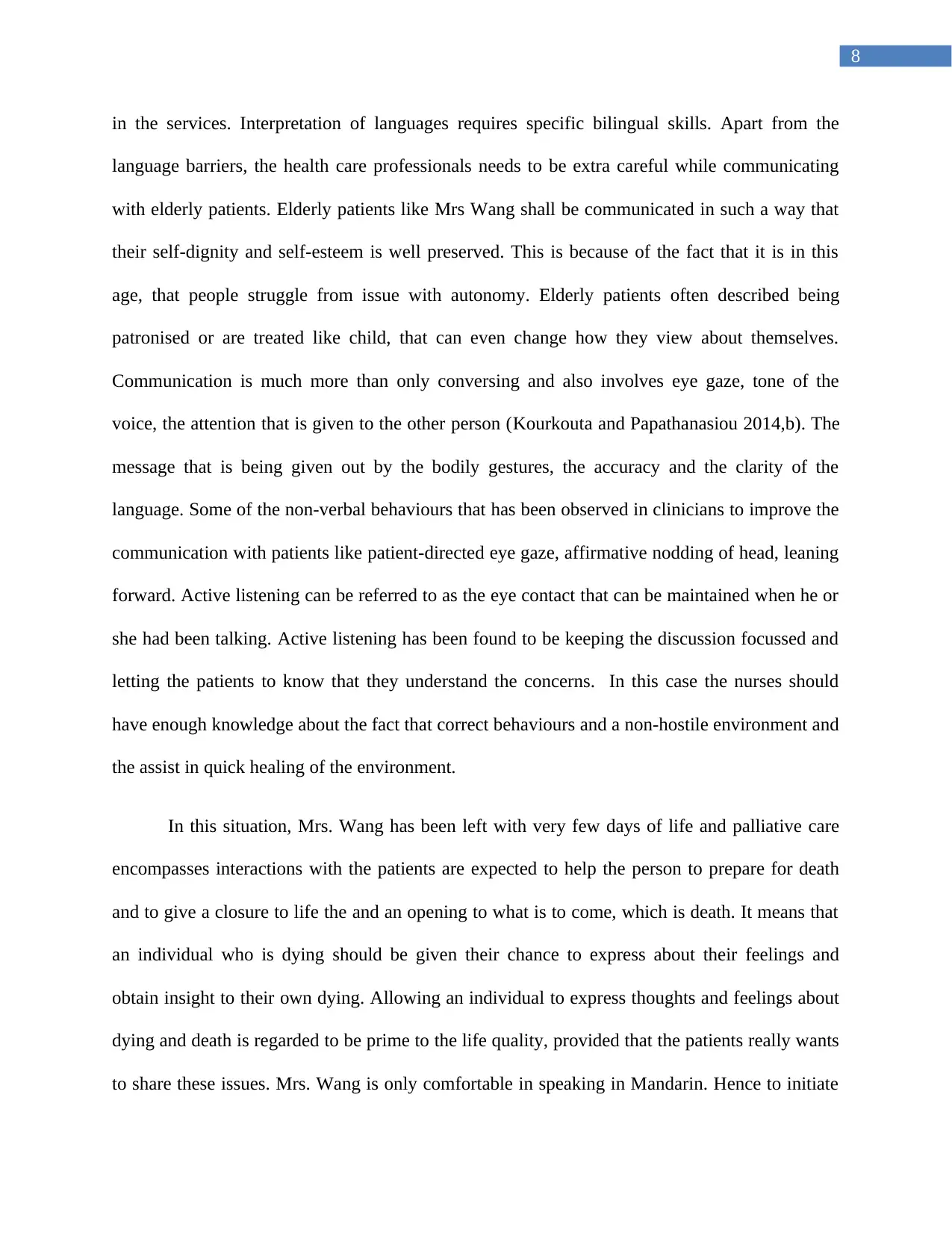
8
in the services. Interpretation of languages requires specific bilingual skills. Apart from the
language barriers, the health care professionals needs to be extra careful while communicating
with elderly patients. Elderly patients like Mrs Wang shall be communicated in such a way that
their self-dignity and self-esteem is well preserved. This is because of the fact that it is in this
age, that people struggle from issue with autonomy. Elderly patients often described being
patronised or are treated like child, that can even change how they view about themselves.
Communication is much more than only conversing and also involves eye gaze, tone of the
voice, the attention that is given to the other person (Kourkouta and Papathanasiou 2014,b). The
message that is being given out by the bodily gestures, the accuracy and the clarity of the
language. Some of the non-verbal behaviours that has been observed in clinicians to improve the
communication with patients like patient-directed eye gaze, affirmative nodding of head, leaning
forward. Active listening can be referred to as the eye contact that can be maintained when he or
she had been talking. Active listening has been found to be keeping the discussion focussed and
letting the patients to know that they understand the concerns. In this case the nurses should
have enough knowledge about the fact that correct behaviours and a non-hostile environment and
the assist in quick healing of the environment.
In this situation, Mrs. Wang has been left with very few days of life and palliative care
encompasses interactions with the patients are expected to help the person to prepare for death
and to give a closure to life the and an opening to what is to come, which is death. It means that
an individual who is dying should be given their chance to express about their feelings and
obtain insight to their own dying. Allowing an individual to express thoughts and feelings about
dying and death is regarded to be prime to the life quality, provided that the patients really wants
to share these issues. Mrs. Wang is only comfortable in speaking in Mandarin. Hence to initiate
in the services. Interpretation of languages requires specific bilingual skills. Apart from the
language barriers, the health care professionals needs to be extra careful while communicating
with elderly patients. Elderly patients like Mrs Wang shall be communicated in such a way that
their self-dignity and self-esteem is well preserved. This is because of the fact that it is in this
age, that people struggle from issue with autonomy. Elderly patients often described being
patronised or are treated like child, that can even change how they view about themselves.
Communication is much more than only conversing and also involves eye gaze, tone of the
voice, the attention that is given to the other person (Kourkouta and Papathanasiou 2014,b). The
message that is being given out by the bodily gestures, the accuracy and the clarity of the
language. Some of the non-verbal behaviours that has been observed in clinicians to improve the
communication with patients like patient-directed eye gaze, affirmative nodding of head, leaning
forward. Active listening can be referred to as the eye contact that can be maintained when he or
she had been talking. Active listening has been found to be keeping the discussion focussed and
letting the patients to know that they understand the concerns. In this case the nurses should
have enough knowledge about the fact that correct behaviours and a non-hostile environment and
the assist in quick healing of the environment.
In this situation, Mrs. Wang has been left with very few days of life and palliative care
encompasses interactions with the patients are expected to help the person to prepare for death
and to give a closure to life the and an opening to what is to come, which is death. It means that
an individual who is dying should be given their chance to express about their feelings and
obtain insight to their own dying. Allowing an individual to express thoughts and feelings about
dying and death is regarded to be prime to the life quality, provided that the patients really wants
to share these issues. Mrs. Wang is only comfortable in speaking in Mandarin. Hence to initiate
⊘ This is a preview!⊘
Do you want full access?
Subscribe today to unlock all pages.

Trusted by 1+ million students worldwide
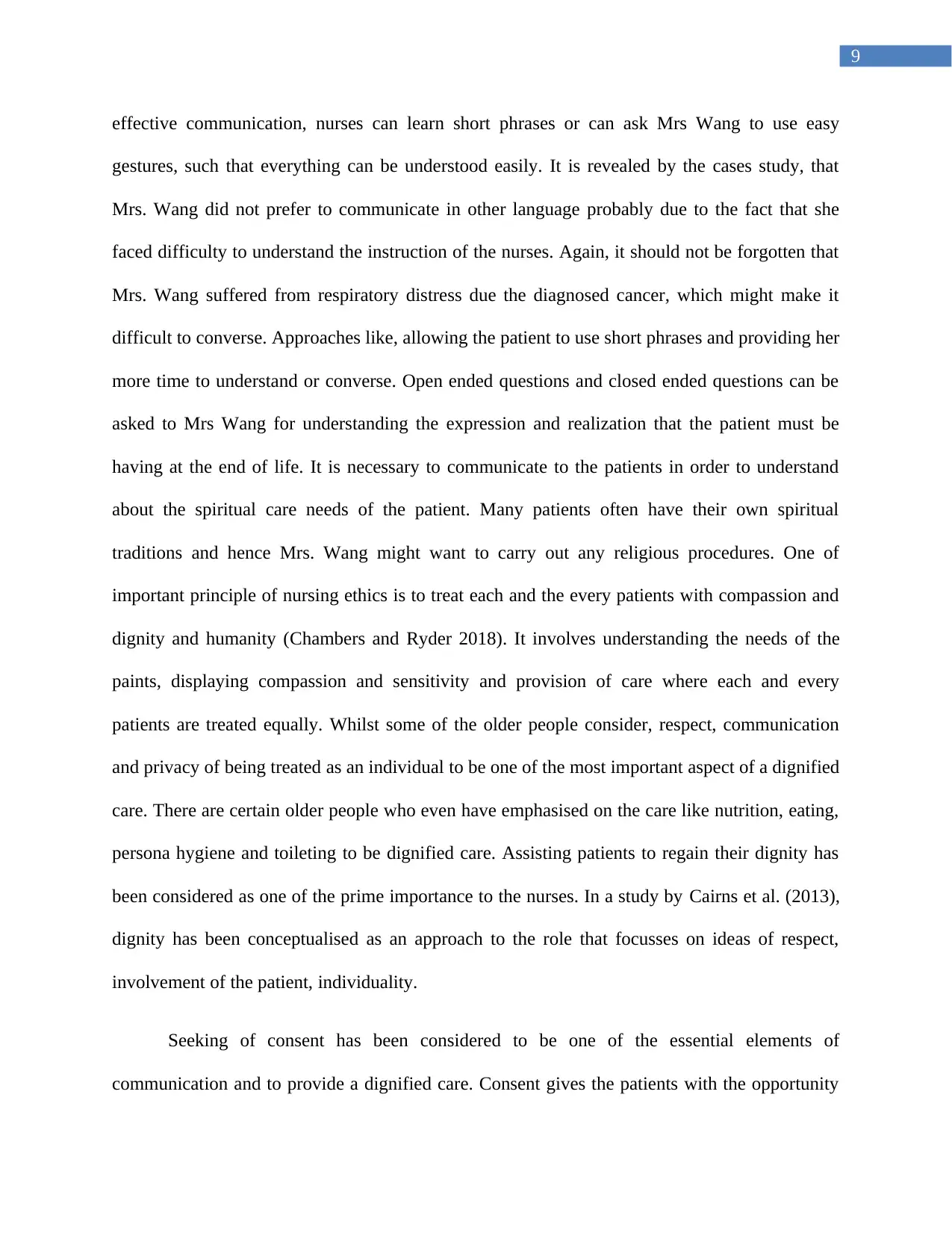
9
effective communication, nurses can learn short phrases or can ask Mrs Wang to use easy
gestures, such that everything can be understood easily. It is revealed by the cases study, that
Mrs. Wang did not prefer to communicate in other language probably due to the fact that she
faced difficulty to understand the instruction of the nurses. Again, it should not be forgotten that
Mrs. Wang suffered from respiratory distress due the diagnosed cancer, which might make it
difficult to converse. Approaches like, allowing the patient to use short phrases and providing her
more time to understand or converse. Open ended questions and closed ended questions can be
asked to Mrs Wang for understanding the expression and realization that the patient must be
having at the end of life. It is necessary to communicate to the patients in order to understand
about the spiritual care needs of the patient. Many patients often have their own spiritual
traditions and hence Mrs. Wang might want to carry out any religious procedures. One of
important principle of nursing ethics is to treat each and the every patients with compassion and
dignity and humanity (Chambers and Ryder 2018). It involves understanding the needs of the
paints, displaying compassion and sensitivity and provision of care where each and every
patients are treated equally. Whilst some of the older people consider, respect, communication
and privacy of being treated as an individual to be one of the most important aspect of a dignified
care. There are certain older people who even have emphasised on the care like nutrition, eating,
persona hygiene and toileting to be dignified care. Assisting patients to regain their dignity has
been considered as one of the prime importance to the nurses. In a study by Cairns et al. (2013),
dignity has been conceptualised as an approach to the role that focusses on ideas of respect,
involvement of the patient, individuality.
Seeking of consent has been considered to be one of the essential elements of
communication and to provide a dignified care. Consent gives the patients with the opportunity
effective communication, nurses can learn short phrases or can ask Mrs Wang to use easy
gestures, such that everything can be understood easily. It is revealed by the cases study, that
Mrs. Wang did not prefer to communicate in other language probably due to the fact that she
faced difficulty to understand the instruction of the nurses. Again, it should not be forgotten that
Mrs. Wang suffered from respiratory distress due the diagnosed cancer, which might make it
difficult to converse. Approaches like, allowing the patient to use short phrases and providing her
more time to understand or converse. Open ended questions and closed ended questions can be
asked to Mrs Wang for understanding the expression and realization that the patient must be
having at the end of life. It is necessary to communicate to the patients in order to understand
about the spiritual care needs of the patient. Many patients often have their own spiritual
traditions and hence Mrs. Wang might want to carry out any religious procedures. One of
important principle of nursing ethics is to treat each and the every patients with compassion and
dignity and humanity (Chambers and Ryder 2018). It involves understanding the needs of the
paints, displaying compassion and sensitivity and provision of care where each and every
patients are treated equally. Whilst some of the older people consider, respect, communication
and privacy of being treated as an individual to be one of the most important aspect of a dignified
care. There are certain older people who even have emphasised on the care like nutrition, eating,
persona hygiene and toileting to be dignified care. Assisting patients to regain their dignity has
been considered as one of the prime importance to the nurses. In a study by Cairns et al. (2013),
dignity has been conceptualised as an approach to the role that focusses on ideas of respect,
involvement of the patient, individuality.
Seeking of consent has been considered to be one of the essential elements of
communication and to provide a dignified care. Consent gives the patients with the opportunity
Paraphrase This Document
Need a fresh take? Get an instant paraphrase of this document with our AI Paraphraser
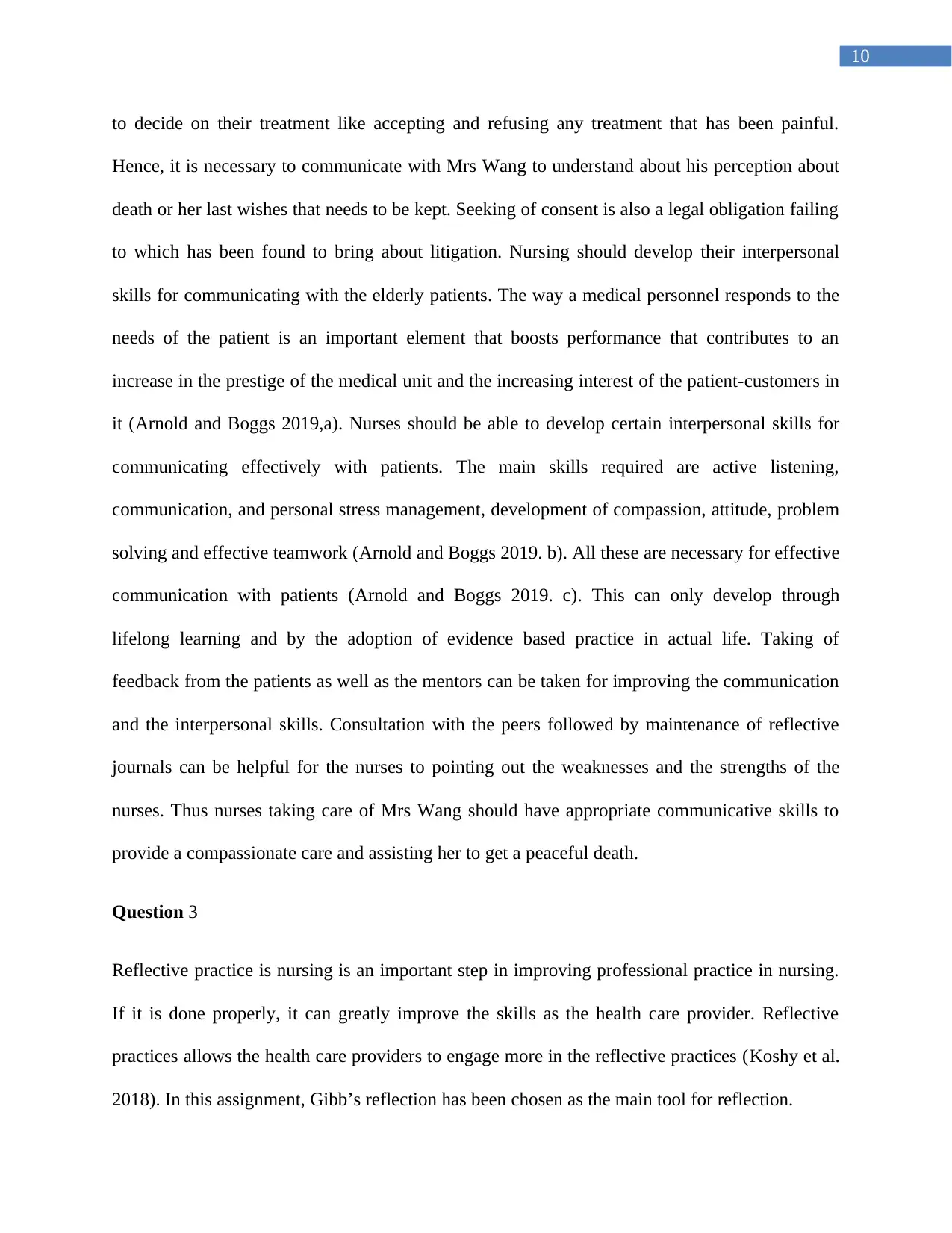
10
to decide on their treatment like accepting and refusing any treatment that has been painful.
Hence, it is necessary to communicate with Mrs Wang to understand about his perception about
death or her last wishes that needs to be kept. Seeking of consent is also a legal obligation failing
to which has been found to bring about litigation. Nursing should develop their interpersonal
skills for communicating with the elderly patients. The way a medical personnel responds to the
needs of the patient is an important element that boosts performance that contributes to an
increase in the prestige of the medical unit and the increasing interest of the patient-customers in
it (Arnold and Boggs 2019,a). Nurses should be able to develop certain interpersonal skills for
communicating effectively with patients. The main skills required are active listening,
communication, and personal stress management, development of compassion, attitude, problem
solving and effective teamwork (Arnold and Boggs 2019. b). All these are necessary for effective
communication with patients (Arnold and Boggs 2019. c). This can only develop through
lifelong learning and by the adoption of evidence based practice in actual life. Taking of
feedback from the patients as well as the mentors can be taken for improving the communication
and the interpersonal skills. Consultation with the peers followed by maintenance of reflective
journals can be helpful for the nurses to pointing out the weaknesses and the strengths of the
nurses. Thus nurses taking care of Mrs Wang should have appropriate communicative skills to
provide a compassionate care and assisting her to get a peaceful death.
Question 3
Reflective practice is nursing is an important step in improving professional practice in nursing.
If it is done properly, it can greatly improve the skills as the health care provider. Reflective
practices allows the health care providers to engage more in the reflective practices (Koshy et al.
2018). In this assignment, Gibb’s reflection has been chosen as the main tool for reflection.
to decide on their treatment like accepting and refusing any treatment that has been painful.
Hence, it is necessary to communicate with Mrs Wang to understand about his perception about
death or her last wishes that needs to be kept. Seeking of consent is also a legal obligation failing
to which has been found to bring about litigation. Nursing should develop their interpersonal
skills for communicating with the elderly patients. The way a medical personnel responds to the
needs of the patient is an important element that boosts performance that contributes to an
increase in the prestige of the medical unit and the increasing interest of the patient-customers in
it (Arnold and Boggs 2019,a). Nurses should be able to develop certain interpersonal skills for
communicating effectively with patients. The main skills required are active listening,
communication, and personal stress management, development of compassion, attitude, problem
solving and effective teamwork (Arnold and Boggs 2019. b). All these are necessary for effective
communication with patients (Arnold and Boggs 2019. c). This can only develop through
lifelong learning and by the adoption of evidence based practice in actual life. Taking of
feedback from the patients as well as the mentors can be taken for improving the communication
and the interpersonal skills. Consultation with the peers followed by maintenance of reflective
journals can be helpful for the nurses to pointing out the weaknesses and the strengths of the
nurses. Thus nurses taking care of Mrs Wang should have appropriate communicative skills to
provide a compassionate care and assisting her to get a peaceful death.
Question 3
Reflective practice is nursing is an important step in improving professional practice in nursing.
If it is done properly, it can greatly improve the skills as the health care provider. Reflective
practices allows the health care providers to engage more in the reflective practices (Koshy et al.
2018). In this assignment, Gibb’s reflection has been chosen as the main tool for reflection.
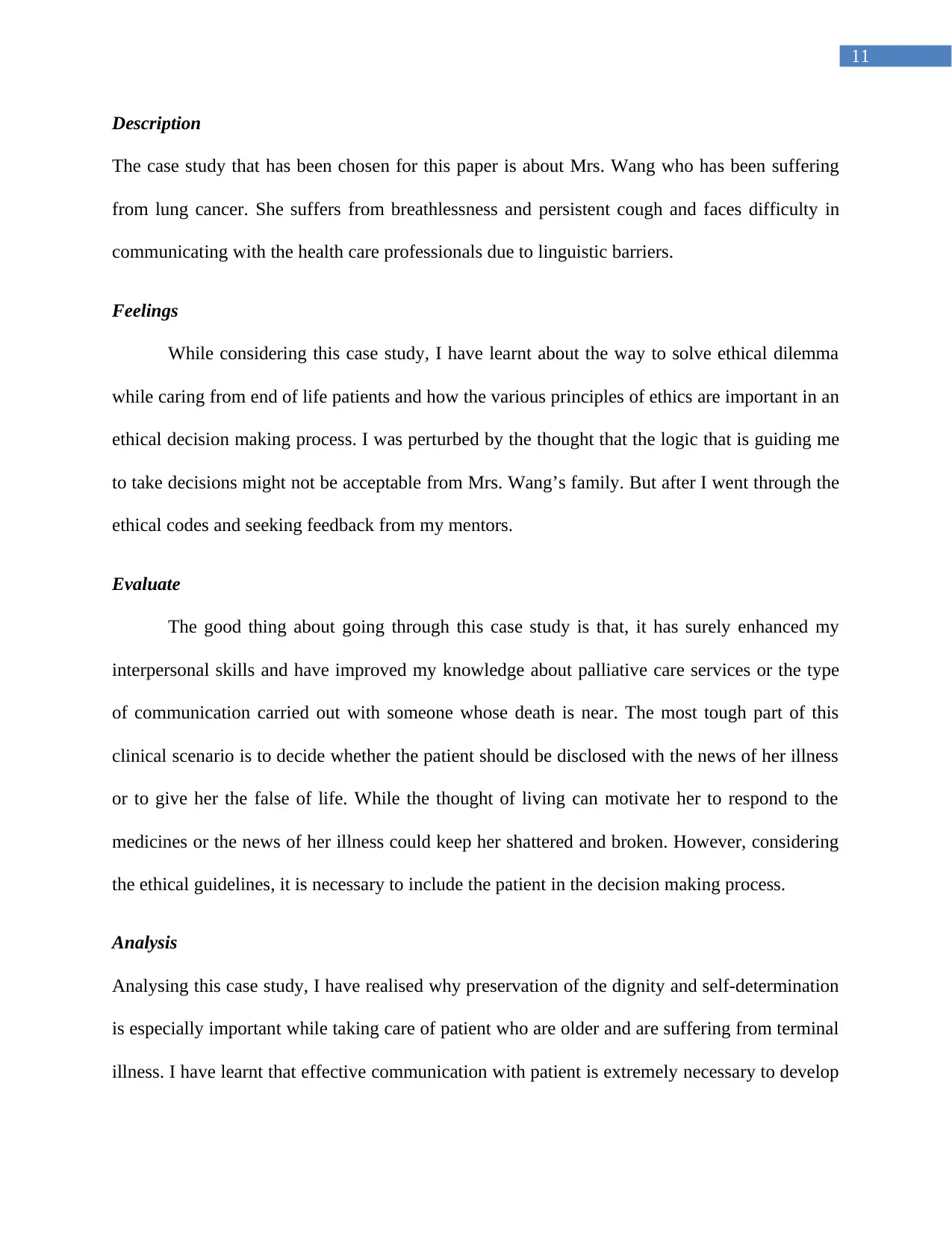
11
Description
The case study that has been chosen for this paper is about Mrs. Wang who has been suffering
from lung cancer. She suffers from breathlessness and persistent cough and faces difficulty in
communicating with the health care professionals due to linguistic barriers.
Feelings
While considering this case study, I have learnt about the way to solve ethical dilemma
while caring from end of life patients and how the various principles of ethics are important in an
ethical decision making process. I was perturbed by the thought that the logic that is guiding me
to take decisions might not be acceptable from Mrs. Wang’s family. But after I went through the
ethical codes and seeking feedback from my mentors.
Evaluate
The good thing about going through this case study is that, it has surely enhanced my
interpersonal skills and have improved my knowledge about palliative care services or the type
of communication carried out with someone whose death is near. The most tough part of this
clinical scenario is to decide whether the patient should be disclosed with the news of her illness
or to give her the false of life. While the thought of living can motivate her to respond to the
medicines or the news of her illness could keep her shattered and broken. However, considering
the ethical guidelines, it is necessary to include the patient in the decision making process.
Analysis
Analysing this case study, I have realised why preservation of the dignity and self-determination
is especially important while taking care of patient who are older and are suffering from terminal
illness. I have learnt that effective communication with patient is extremely necessary to develop
Description
The case study that has been chosen for this paper is about Mrs. Wang who has been suffering
from lung cancer. She suffers from breathlessness and persistent cough and faces difficulty in
communicating with the health care professionals due to linguistic barriers.
Feelings
While considering this case study, I have learnt about the way to solve ethical dilemma
while caring from end of life patients and how the various principles of ethics are important in an
ethical decision making process. I was perturbed by the thought that the logic that is guiding me
to take decisions might not be acceptable from Mrs. Wang’s family. But after I went through the
ethical codes and seeking feedback from my mentors.
Evaluate
The good thing about going through this case study is that, it has surely enhanced my
interpersonal skills and have improved my knowledge about palliative care services or the type
of communication carried out with someone whose death is near. The most tough part of this
clinical scenario is to decide whether the patient should be disclosed with the news of her illness
or to give her the false of life. While the thought of living can motivate her to respond to the
medicines or the news of her illness could keep her shattered and broken. However, considering
the ethical guidelines, it is necessary to include the patient in the decision making process.
Analysis
Analysing this case study, I have realised why preservation of the dignity and self-determination
is especially important while taking care of patient who are older and are suffering from terminal
illness. I have learnt that effective communication with patient is extremely necessary to develop
⊘ This is a preview!⊘
Do you want full access?
Subscribe today to unlock all pages.

Trusted by 1+ million students worldwide
1 out of 16
Related Documents
Your All-in-One AI-Powered Toolkit for Academic Success.
+13062052269
info@desklib.com
Available 24*7 on WhatsApp / Email
![[object Object]](/_next/static/media/star-bottom.7253800d.svg)
Unlock your academic potential
Copyright © 2020–2026 A2Z Services. All Rights Reserved. Developed and managed by ZUCOL.




